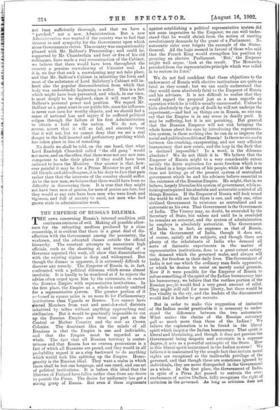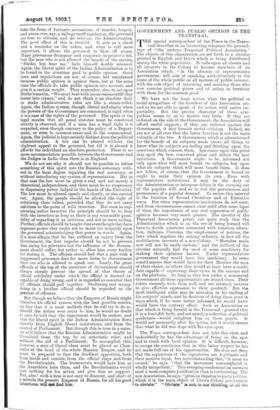THE EMPEROR OF RUSSIA'S DILEMMA. T HE news concerning Russia's internal
condition still continues ominous of evil. Making all possible allow- ance for the refracting medium produced by a close censorship, it is evident that there is a great deal of dis- affection with the Government among the peasantry, the workmen, and the educated classes outside the official hierarchy. The constant attempts to assassinate high officials, such as the shooting at and wounding of a Governor reported this week, all show that dissatisfaction with the existing regime is deep and widespread. But though the disease is apparent, it is extremely difficult to discover any remedy. The Emperor of Russia is, in fact, confronted with a political dilemma which seems almost insoluble. It is hardly to be wondered at if he rejects the advice often urged upon him by the extremists, to endow the Russian Empire with representative institutions. In the first place, the Empire as a whole is entirely unfitted fer a representative system. The greater portion of it re•-koned in square miles is no more fit for Parliamentary institutions than Uganda or Borneo. You cannot have elected Members from vast and semi-deserted districts inhabited by tribes without anything approaching real civilisation. But it would be practically impossible to cut up the Russian Empire and treat one part as the Central or Mother Country and the rest as Crown Colonies. The dominant idea in the minds of all Russians is that the Empire is one and indivisible, and that the Empire must be regarded as a whole. The fact that all Russian territory is conter- minous and that Russia has no oversea possessions is a fact of which all Russians are proud, and they would in all probability regard it as a step backward to do anything which would look like splitting up the Empire. Homo- geneity is the Russian ideal. They want a realm in which there shall be but one language, and one creed, and one set of political institutions. It is before this ideal that the liberties of Finland have fallen rather than from any desire to punish the Finns. The desire for uniformity has got a strong grasp of Russia. But even if these arguments against establishing a political representative system did not seem imperative to the Emperor, we can well under- stand that he would shrink from the notion of meeting revolutionary demands by the grant of a Parliament. No autocratic ruler ever forgets the example of the States- General. All the logic seemed in favour of those who said that the French King would strengthen his position by granting an elective Parliament. But,' the Emperor might well argue, look at the result. The Monarchy perished from the representative principle which was called in to restore its force.'
We do not feel confident that these objections to the endowment of Russia with elective institutions are quite as fatal as they sound ; but we can easily understand that they would seem absolutely fatal to the Emperor of Russia and his advisers. It is not difficult to realise that they would regard the proposal just as a man regards an operation which he is told is usually unsuccessful. Unless he feels absolutely in the grip of death he will not undergo the experiment,—and bad as things are in Russia, no one can say that the Empire is in any sense in deadly peril. It may be suffering, but it is not perishing. But granted that the Russian Emperor will not risk bringing the whole house about his ears by introducing the representa- tive system, is there nothing else he can do to improye the social and politicalcondition of Russia? Is there no viamedia between the crushing, exasperating, and not very efficient bureaucracy that now exists, and the leap in the dark that is declared impossible ? In a word, is the dilemma absolute ? We do not think it is. We believe that the Emperor of Russia might to a very considerable extent satisfy the fierce aspiration for more freedom which is to be found in a large section of his people, while at the same time not letting go of the present system of centralised government which he and his advisers believe essential to the existence of the Russian Empire. He might, that is, we believe, largely liberalise his system of government, while re. tainin g unimpaired his absolute and autocratic control of all things Russian. If the Emperor of Russia will look round the world he will see that there is one, and only one, other civilised Government in existence as centralised and as autocratic as his own. That Government is the Government of India. The Viceroy may, no doubt, be overruled by the Secretary of State, but unless and until he is overruled he remains an autocrat, and the system of administration he employs is absolutely autocratic. The Government of India is, in fact, as supreme as that of Russia. Yet the Government of India, though it does not, of course, satisfy all its subjects, and though there are plenty of the inhabitants of India who demand all sorts of fantastic experiments in the matter of representative institutions, does to a great extent satisfy the demand which the governed make, and always will make, for freedom in their daily lives. The Government of India is not one which the ordinary man finds oppressive, or which he desires to resist on merely social grounds. Now if it were possible for the Emperor of Russia to infuse something of the spirit of the Indian bureaucracy into his bureaucracy, we believe that the restless portion of the Russian people would find a very great amount of relief. They might still call for more liberty, but there would be less vitality in the cry, and the leaders of the discontented would find it harder to get recruits.
But in order to make this suggestion of imitation of the Indian model practicable it is necessary to under- stand the difference between the two autocracies. What makes the chains of the Russian autocracy gall so much more than those of the Indian ? We believe the explanation is to be found in the liberal spirit which inspires the Indian bureaucracy. That spirit is liberal and liberalising, and though it does not prevent the Government being despotic and autocratic in a supreme degree, it acts as a powerful antiseptic of the State. How is this liberal spirit maintained in the Indian system ? We believe it is maintained by the simple fact that certain moral rights are recognised as the inalienable privilege of the governed, and that though these are sometimes ignored by individuals, they are never disregarded in the Government as a whole. In the first place, the Government of India, in spite of a Press Act passed to restrain the over- exuberance of native libellers, fully recognises the right of criticism in the governed. As long as criticism does not take the form of fantastic accusations of murder, forgery, and arson over, say, a railway tariff regulation, the governed are free to criticise, and do criticise, the Administration. The good effect of this is twofold. It acts as a check and a reminder on the rulers, and, what is still more important, it allows the governed to blow off steam. Many grievances disappear and evaporate in printer's ink, but the man who is not allowed the benefit of the maxim, " Strike, but hear me," feels himself doubly misused. Again, the liberal spirit of the Indian Administration is to be found in the attention paid to public opinion. Good laws and regulations are not, of course, left unenforced because public opinion is against them, but at the same time the officials do take public opinion into account, and give it a certain weight. They remember, also, to act upon Burke's maxim, "We must bear with inconveniencestill they fester into crimes," and do not think it an absolute duty to make administrative rules act like a steam-roller. Again, the Indian system, though liberal and elastic when the powers of the Government are concerned, is rigid when it is a case of the rights of the governed. The spirit of the legal maxim that all penal statutes must be construed strictly is observed, and if a man has a legal right it is respected, even though contrary to the policy of a Depart- ment, or even to common-sense and to the commonweal. Again, the judicial is kept entirely distinct from the political administration. A law can be altered without the slightest appeal to the governed, but till it is altered it affords the individual an absolute protection. There is no more accommodation possible between the Government and the Judges in India than there is in England.
We do not see why it should not be possible to infuse something of this spirit into the Russian autocracy with- out in the least degree inpairing the real autocracy, or without introducing any system of representation. But in that case the law must be given a real, and not merely a theoretical, independence, and there must be no suspensory or dispensing power lodged in the hands of the Executive. The law must be altered openly and clearly, or else carried out. Again, the people should be allowed the right of criticising their rulers, provided that they do not carry criticism to the point of wild invective. But even in sup- pressing unfair invective the principle should be to bear with the invective as long as there is any reasonable possi- bility of regarding it as criticism, and not as mere railing. Further, officials should be taught thateven though they have supreme power they ought not to insist too minutely upon the governed acknowledging that power in words. Again, if a man alleges that he has suffered an injury from the Government, the first impulse should be, not to prevent him airing his grievance lest the influence of the Govern- ment should suffer, but rather to allow him every facility for stating it. The officials should feel that a man with a suppressed grievance does far more harm to Government than one who is allowed to speak out. Lastly, the great officials at the top of the structure of Government should always sternly prevent the spread of that theory of official solidarity under which the official is deemed in- capable of doing wrong, and it is regarded as essential that all officials should pull together. Sheltering real wrong- doing in a brother official should be regarded as the greatest of offences.
But though we believe that the Emperor of Russia might liberalise his official system with the best possible results, we fear that it is most unlikely that he will try to do so. Should the notion ever occur to him, he would no doubt at once be told that the experiment would be useless, and that the liberal spirit in the Indian Administration flows directly from English liberal institutions, and from the control of Parliament. But though this is true in a sense, we still believe that the Russian Administration might be liberalised from the top, by an autocratic ruler, and without the aid of a Parliament. To accomplish this, however, a man of liberal ideas must be placed as Chan- cellor at the head of the whole Russian Empire, and he must be prepared to face the deadliest opposition, both from inside and outside, from the official rings and from the Revolutionists. The bureaucrats would hate him as the Anarchists hate them, and the Revolutionists would care nothing for his action and give him no support. But, alas ! such a man is not easy to discover, and short of a miracle the present Emperor of Russia, for all his good intentions, will not find him.



































 Previous page
Previous page